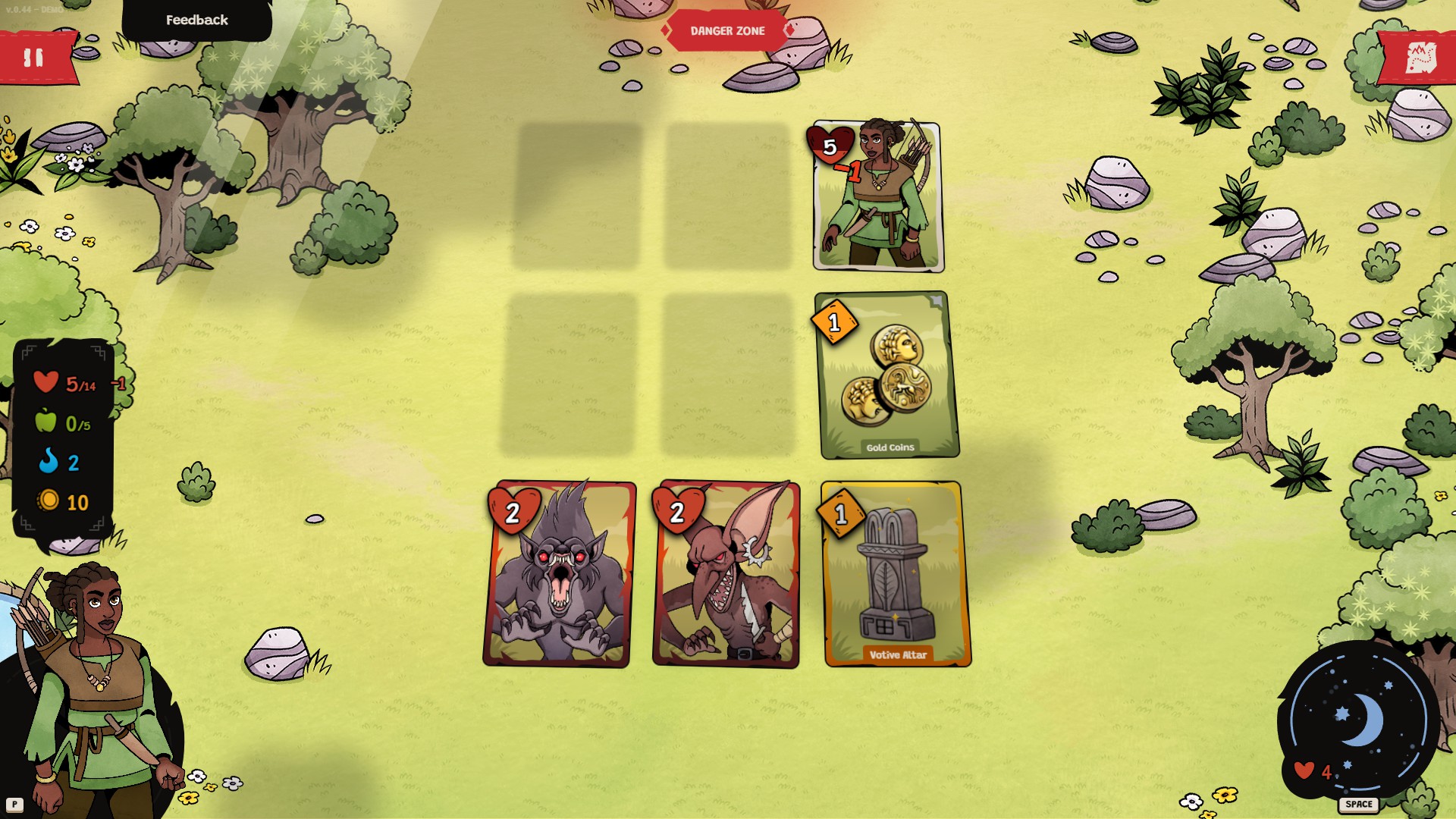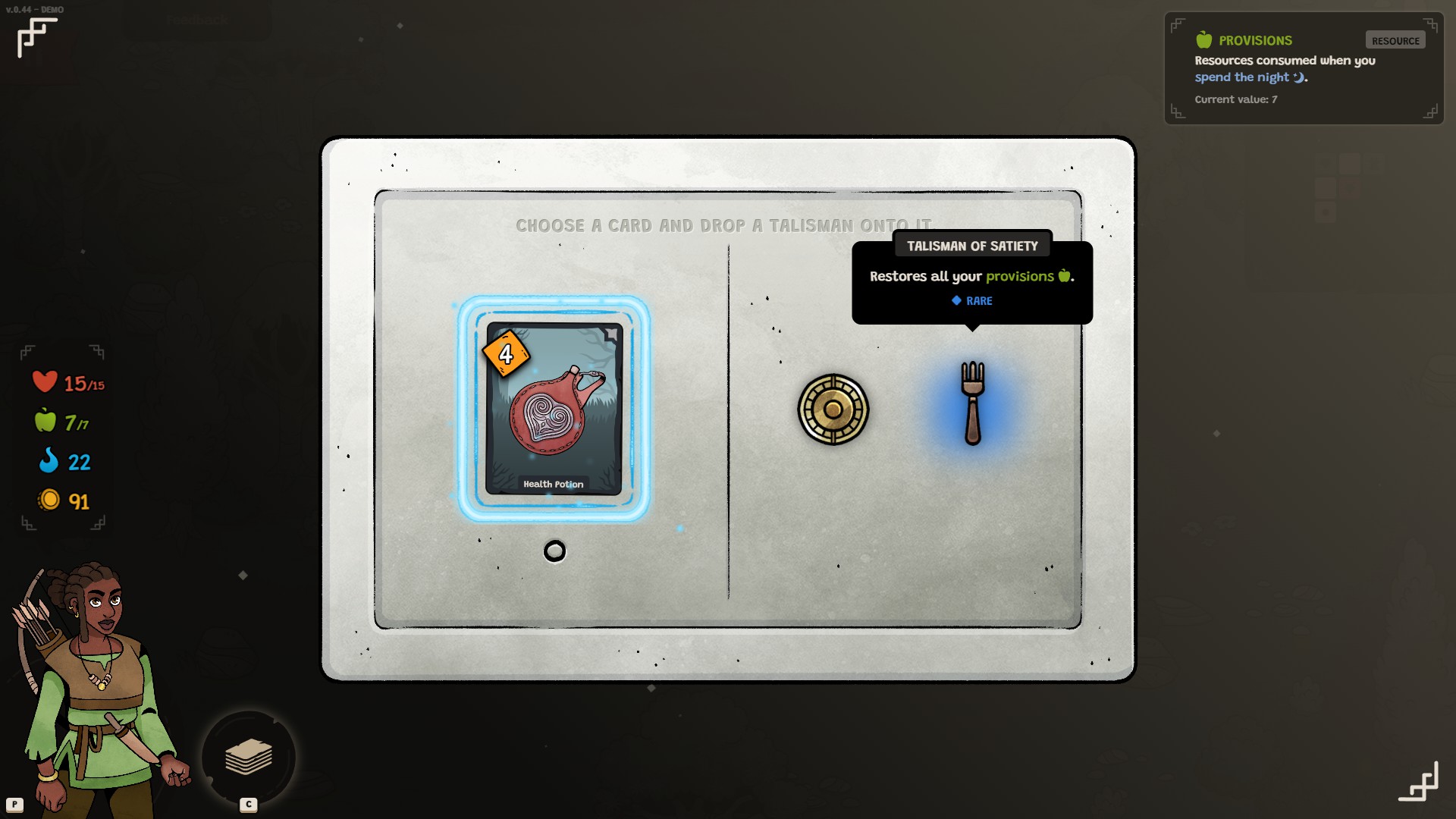Pyrene is a promising roguelike deckbuilder with all the overpowered builds your synergistic heart desires
There's a generous demo to check out, too.
I recently had the pleasure of playing a dash of Pyrene—and as someone with an upsetting amount of hours logged in games like Slay the Spire, I had a grand old time. Pyrene is a deckbuilding roguelike from developer team Two Tiny Dice, a studio headed up by Christophe Coyard—the mind behind the similarly-designed Escape the Fold.
Here's the premise: your village gets attacked by monsters, and now you need to go gather materials to rebuild it. When you die, you black out and wake up back where you started—with all those handy little progression systems (like a tavern, a watchtower, and a marketplace) remaining static.
The meat and bones of Pyrene is all about movement and positioning. In "danger zones", you can move your character's card around with the WASD keys (or the mouse). Move into an enemy and you'll do battle, dealing damage equal to your health to them—while also being struck in return.
Danger zones also feature item cards pulled from your deck—and unlike other roguelikes, you can actually tweak what order these items show up in, which is a huge guardian against annoying RNG. Moving into them will, similarly, cause them to be used.
There are two kickers here that make Pyrene interesting. The first is that you can't retrace your steps, so you need to plot out your route in advance. The second is that every "night" enemies will respawn—and the ones you left on the board will get a little tougher. Spending the night costs an increasing amount of provisions or, if you don't have any, health.

To beat each danger zone you need to spend enough nights and clear enough spaces to spawn a votive altar, then you move into it to win. Pyrene dangles a carrot in front of you, though: beat more monsters, and the altar will give you more rewards. What ensues is a game of resource management, where you're trying to squeeze as much health as you can out of your character without accidentally dying.
Pyrene's surprisingly in-depth demo—which you can play now from the game's Steam page—has two characters from what I could find (one you unlock after a successful clear). It's also nicely generous with a bunch of relics to unlock, a few structures to build, and a three-biome gameplay loop. Even so, my hour spent with it wasn't nearly enough to unlock everything, so you're getting a good chunk of game for free here.
Keep up to date with the most important stories and the best deals, as picked by the PC Gamer team.
The wildly unhinged power spikes that make roguelikes so fun are present, as well. There are some very satisfying systems at play—you can get your Slay the Spire-style relics, sure, but there's also an upgrade system I actually love. While there are certain NPCs who will just buff your card's raw power, there are also talismans, which are like relics that're instead tied to specific cards.

I wound up adding a talisman to a card that buffed all of my items currently on the board—the talisman echoed its effect, doubling that buff. I combined that with a bunch of cards which dealt damage to the whole board and very quickly turned from a scared little hunter into an absolute menace that one-shot the end boss. Completely overpowered, but those are the kinds of combos that make roguelikes sing.
I had to peel myself away from Pyrene to write this, so if you're looking for something to scratch that deckbuilder itch—well, it's free to try. Pyrene's demo was released during the Quebec Games Celebration event on Steam, which starts today and ends February 5. You can keep track of the demos you'll be able to play on the event's official Twitter account.

Harvey's history with games started when he first begged his parents for a World of Warcraft subscription aged 12, though he's since been cursed with Final Fantasy 14-brain and a huge crush on G'raha Tia. He made his start as a freelancer, writing for websites like Techradar, The Escapist, Dicebreaker, The Gamer, Into the Spine—and of course, PC Gamer. He'll sink his teeth into anything that looks interesting, though he has a soft spot for RPGs, soulslikes, roguelikes, deckbuilders, MMOs, and weird indie titles. He also plays a shelf load of TTRPGs in his offline time. Don't ask him what his favourite system is, he has too many.

